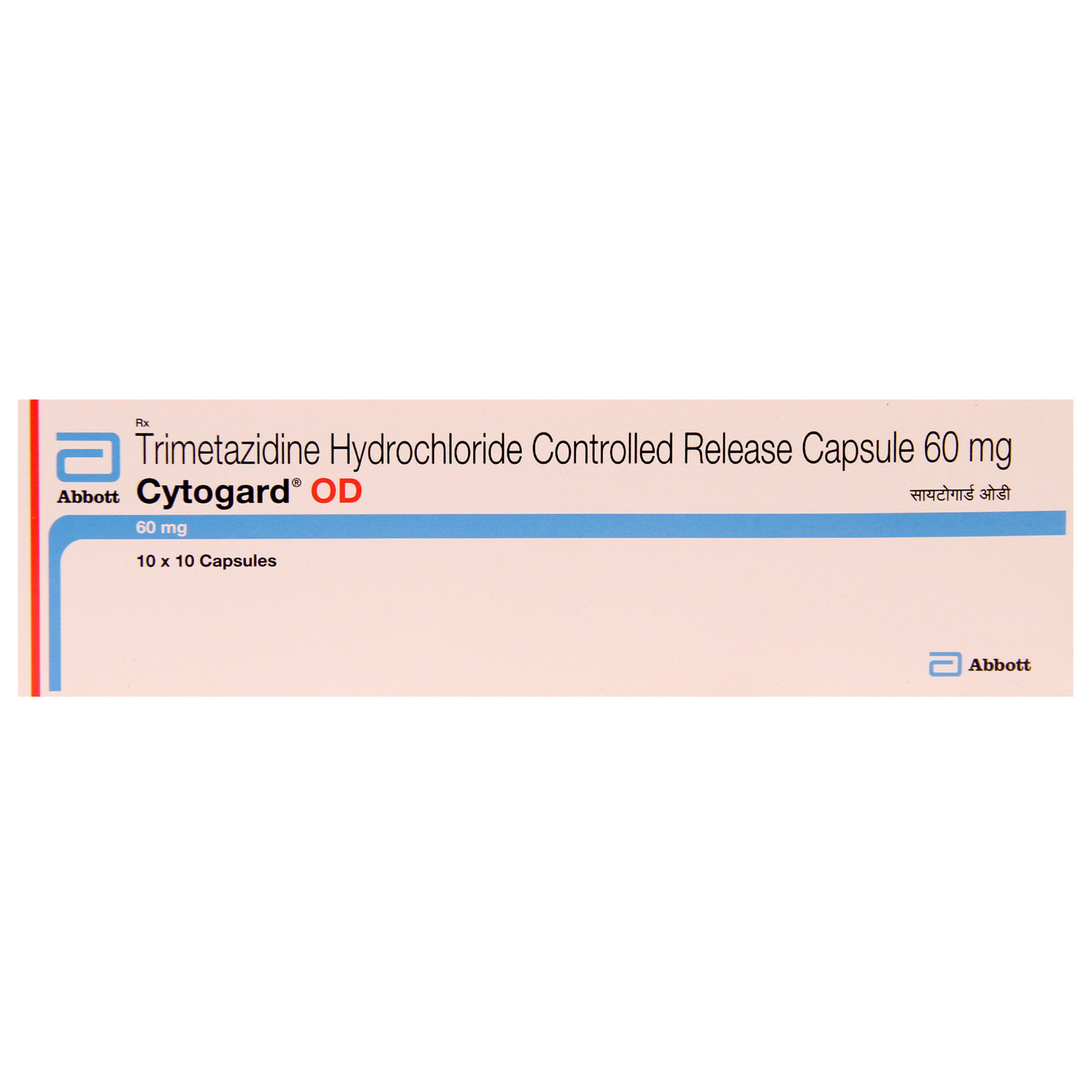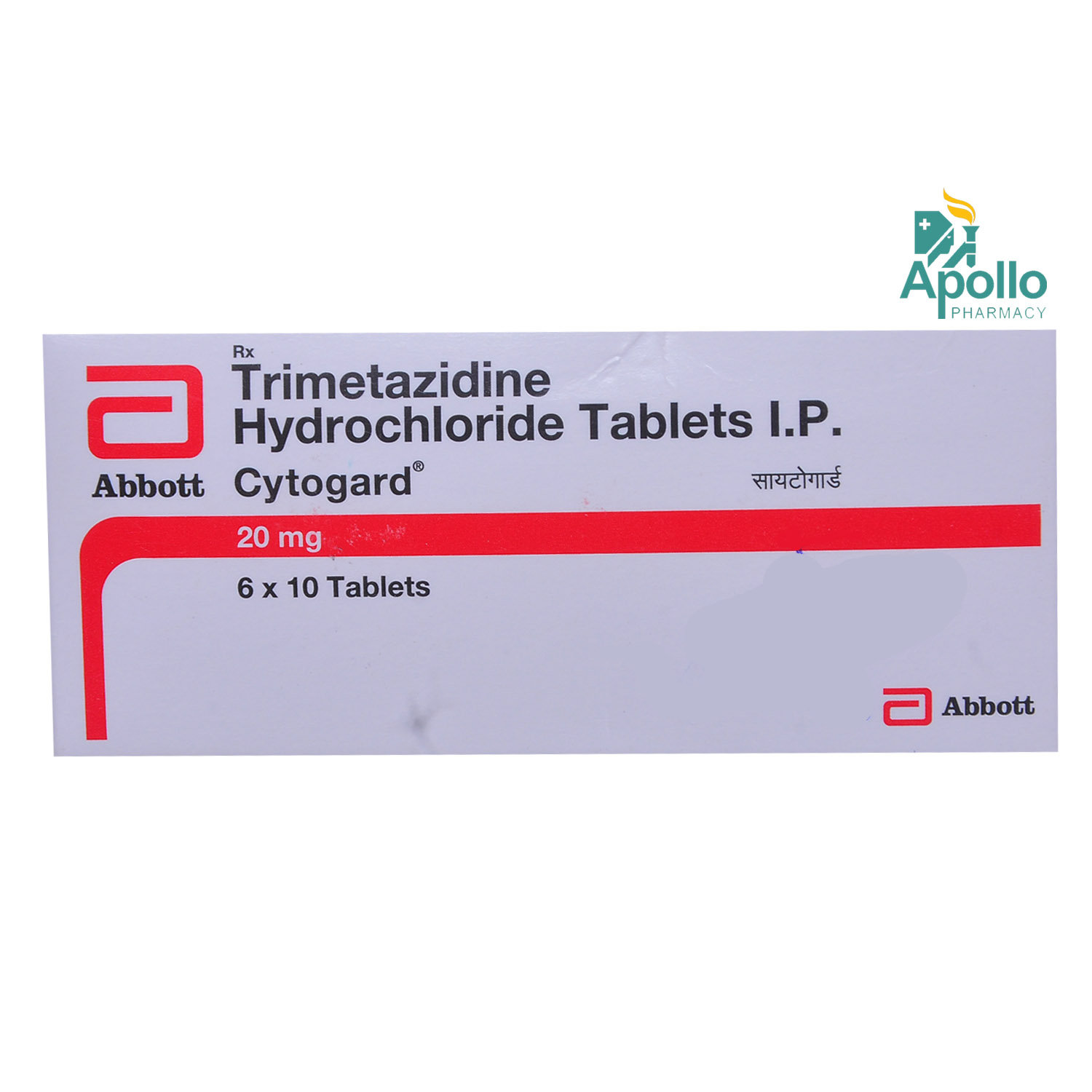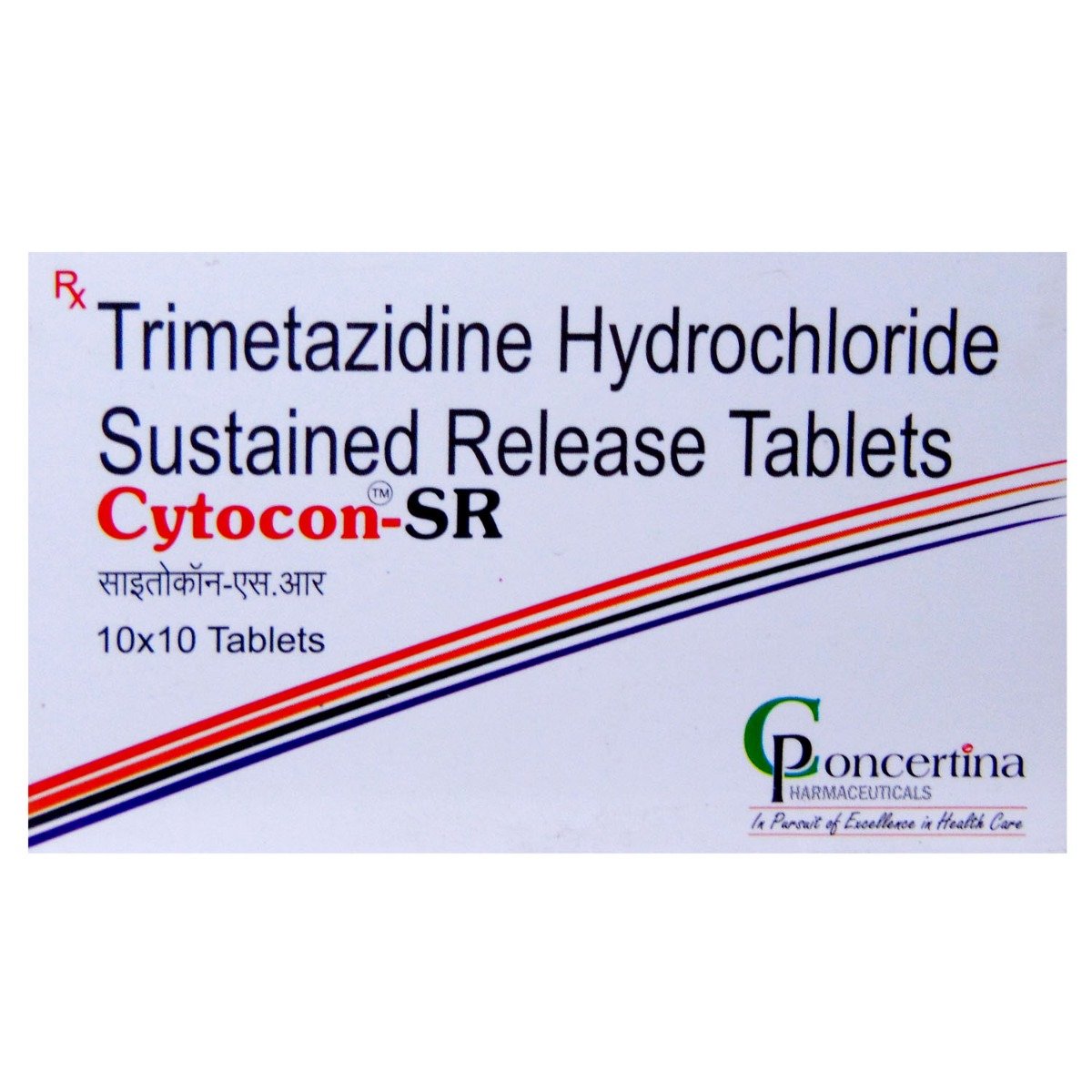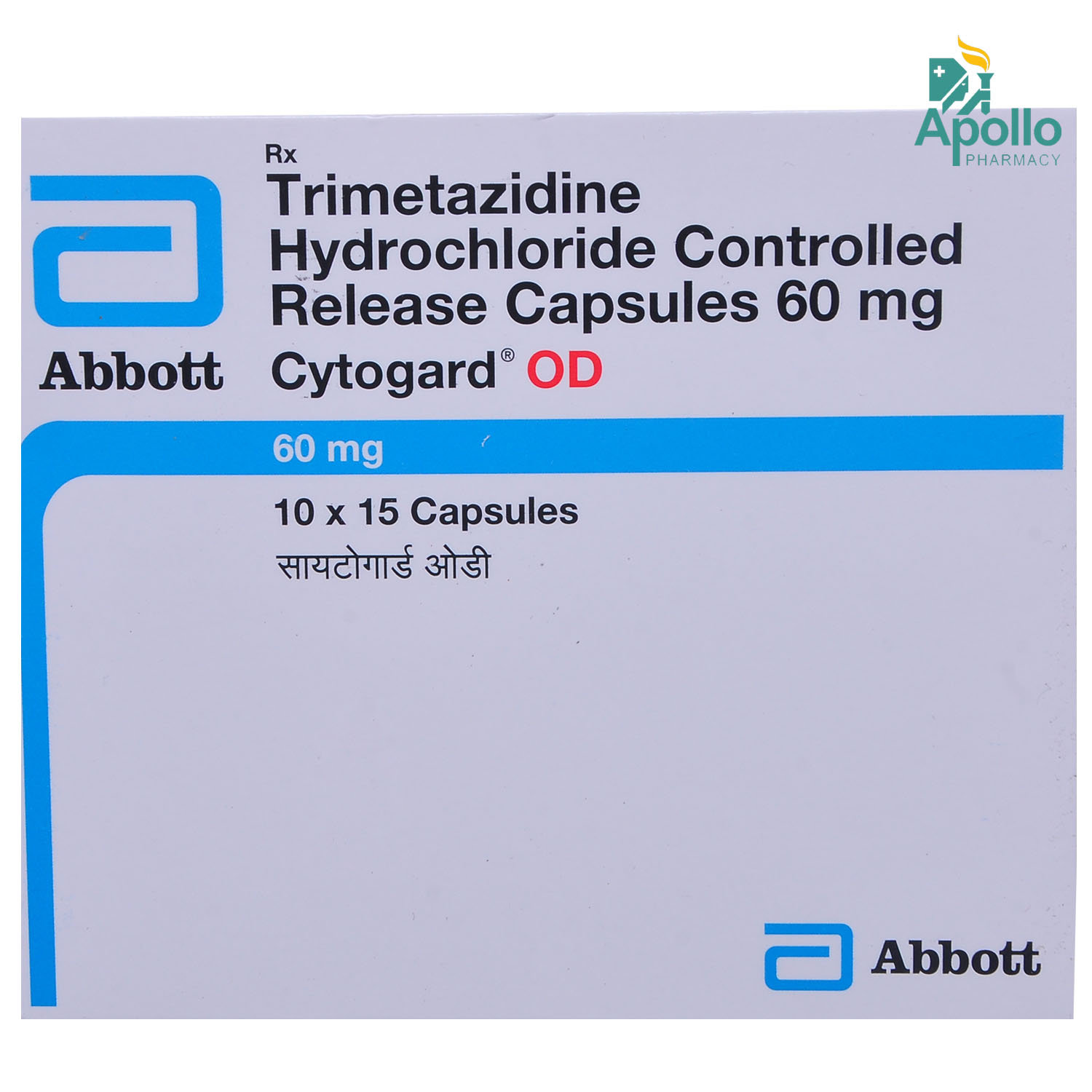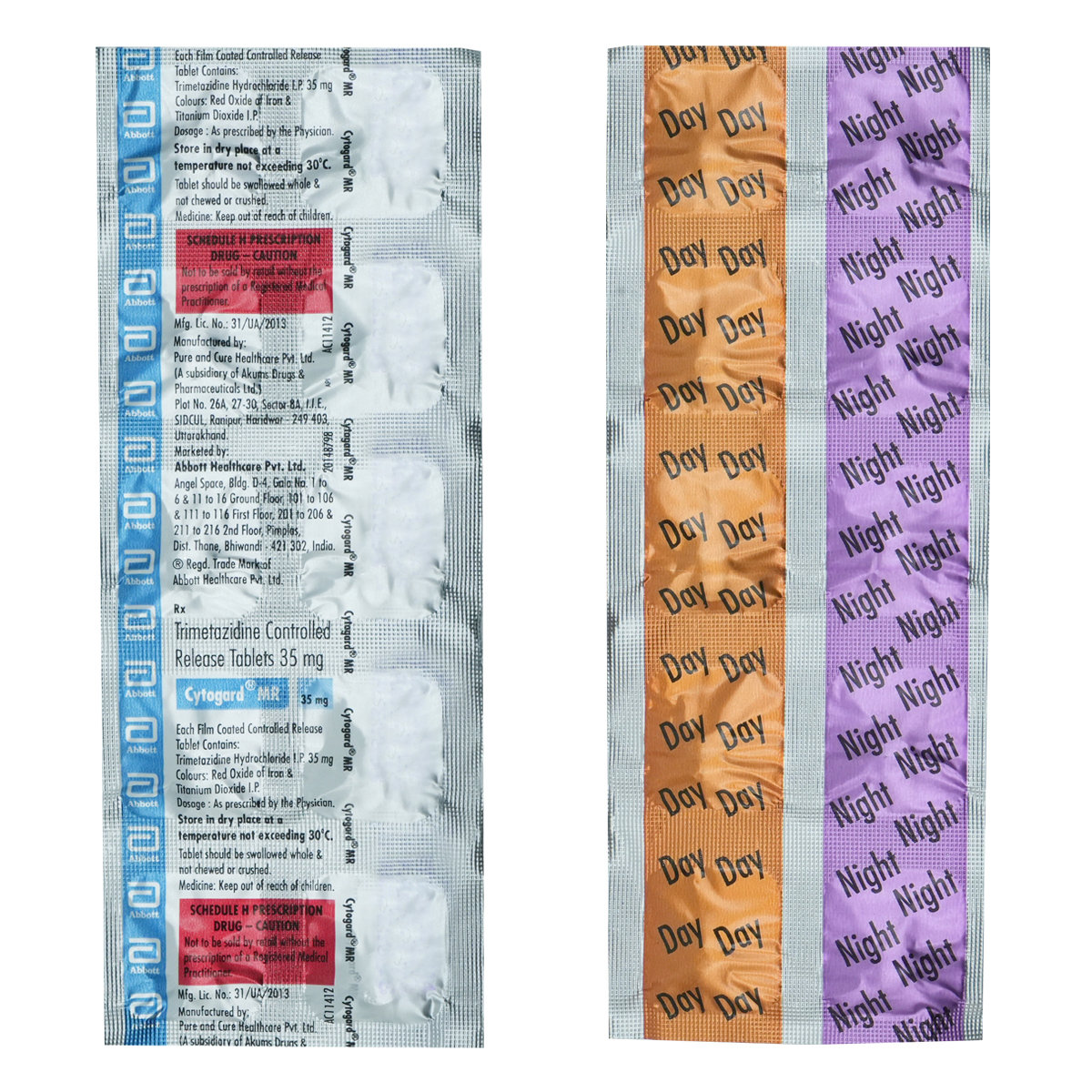Trimetazidine
About Trimetazidine
Trimetazidine is a heart problem-related medication containing Trimetazidine (anti-anginal drug), which is used to prevent an attack of angina pectoris (chest pain caused by coronary disease) in adult patients in combination with other medication. Angina is chest pain which happens when enough supply of oxygen does not reach the heart. The insufficient supply can be due to obstructing the pathway or narrowing the blood vessels.
Trimetazidine contains Trimetazidine, which is a 'metabolic agent.' It affects metabolism (the process by which substances are broken down in the body). Trimetazidine decreases the body's oxygen requirement by shifting metabolism from fats to glucose, increasing the rate at which glucose is broken down. Hence, the heart works efficiently and requires less oxygen. In addition to this, it is also used in treating vertigo (a spinning sensation), tinnitus (ringing sensation in the ears), and to treat reduced vision and visual field disturbances (unclear or disturbed vision).
Trimetazidine can be taken with or without food. Depending on your disease's condition, it should be taken in dose and duration as advised by your doctor. Also, regularly visit a doctor as the dose may vary from time to time. This medicine's common side effects include dizziness, headache, diarrhoea, vomiting, indigestion, abdominal pain, and feeling sick. Everyone doesn't need to experience the above side effects. In case of any discomfort, speak with a doctor.
Trimetazidine should not be stopped suddenly as it may worsen your condition. Also, some lifestyle changes like regular exercise, eating well, smoking cessation, and reducing alcohol can improve the heart's health. People who have a liver or kidney disease, are pregnant or breastfeeding should inform the doctor before starting Trimetazidine as a dose adjustment may be required.
Uses of Trimetazidine
Medicinal Benefits
Trimetazidine contains Trimetazidine, which is a 'metabolic agent'. It affects metabolism (the process by which substances are broken down in the body). Trimetazidine decreases the body's oxygen requirement by shifting metabolism from fats to glucose, increasing the rate at which glucose is broken down. Hence, the heart works efficiently and requires less oxygen. In addition to this, it is also used in treating vertigo (a spinning sensation), tinnitus (ringing sensation in the ears), and to treat reduced vision and visual field disturbances (unclear or disturbed vision).
Directions for Use
Storage
Side Effects of Trimetazidine
- Dizziness
- Headache
- Diarrhoea
- Vomiting
- Indigestion
- Abdominal pain
- Feeling sick
Drug Warnings
Do not take Trimetazidine if you are allergic to trimetazidine or any of the other ingredients. If you have severe kidney problems, are pregnant, or breast-feeding, inform your doctor before starting Trimetazidine. Trimetazidine may worsen symptoms of Parkinson's disease (brain disease affecting movement), so your doctor must know if you have Parkinson's disease and are taking Trimetazidine. Try to adopt a Mediterranean-style diet rich in olive oil, fruits, vegetables, nuts, whole grains, fish, and low red meat and most dairy. American Heart Association recommends sodium chloride intake (table salt) should not exceed more than 2,300 mg per day as part of a healthy eating pattern. As lesser the heart load, the more efficiently it can pump blood and restore to normal functioning. Trimetazidine prevents a new attack of angina but does not prevents an acute attack. Drug Interactions (Drug, Food & Disease).
Drug Interactions
Drug-Drug Interactions: Trimetazidine interacts with Trimetazidine, so it should be used with caution with sedatives or hypnotics (buspirone), strong painkillers, some allergy medications (chlorphenamine), certain antidepressants (fluoxetine and lithium), medicines to lower blood pressure (methyldopa), medicines to treat Parkinson’s disease (levodopa, pramipexole, ropinirole), medicines to treat epilepsy (phenobarbital, carbamazepine, phenytoin, rifampicin, primidone, oxcarbazepine, ethosuximide, valproate).
Drug-Food Interactions: Alcoholic beverages intake should be avoided with Trimetazidine as it may interact with Trimetazidine to produce unpleasant side effects.
Drug-Disease Interactions: Trimetazidine should not be given to patients with active liver disease, Parkinson's disease, kidney impairment.
Drug-Drug Interactions Checker List:
Safety Advice

Alcohol
unsafeTrimetazidine may cause dizziness when alcohol is taken.

Pregnancy
safe if prescribedOnly consume Trimetazidine if a doctor prescribes you.

Breast Feeding
safe if prescribedSafe if prescribed

Driving
cautionDrive with caution, Trimetazidine usually causes blurry vision and may affect driving ability.

Liver
cautionTrimetazidine to be taken with caution, especially if you have a history of liver diseases/conditions. The dose may have to be adjusted by your doctor.

Kidney
cautionTrimetazidine to be taken with caution, especially if you have a history of kidney diseases/conditions. The dose may have to be adjusted by your doctor.

Children
cautionGenerally, Trimetazidine is not recommended for children below 18 years of age without a doctor's consent. In case it has to be given, then the dose has to be adjusted and recommended by a child specialist only.
Habit Forming
Diet & Lifestyle Advise
- Eat a healthy diet rich in soluble fibre like beans, legumes, whole grain, flax, apples, and citrus fruits.
- Try to adopt a Mediterranean-style diet rich in olive oil, fruits, vegetables, nuts, whole grains, fish, and low in red meat and most dairy.
- Try to give priority to more fruits and veggies in your daily meal as these contain antioxidants.
- Minimize the intake of added sugar. The American Heart Association (ADA) recommends, one should not eat more than 100 calories (25 grams) of added sugar for women and children, and no more than 150 calories (37.5 grams) for men every day.
- American Heart Association recommends sodium chloride intake (table salt) should not exceed more than 2,300 mg per day as part of a healthy eating pattern.
- As a precautionary measure, do not consume alcohol and quit smoking.
Special Advise
Patients Concern
Disease/Condition Glossary
Angina Pectoris: Angina is chest pain which happens when enough supply of oxygen does not reach the heart. This can be due to obstruction in the pathway or narrowing of the blood vessels. Patients with angina often explain the chest pain as squeezing, tightening, or pressure in the chest. Other symptoms can be dizziness, sweating, heartburn, and difficulty breathing.
FAQs
Trimetazidine decreases the body's oxygen requirement by shifting metabolism from fats to glucose, increasing the rate at which glucose is broken down. Hence, the heart works efficiently and requires less oxygen.
No, Trimetazidine does not stop acute attacks (sudden attack) of angina, but Trimetazidine helps to prevent a new attack.
In case you have missed a dose of Trimetazidine, you are advised to take it as soon as you remember. However, try not to miss a dose in the first place; if it's time for you to take your next dose, then do not take both the doses together. Take only one dose; taking a double dose of Trimetazidine will lead to low blood pressure.
Usually, Trimetazidine is prescribed for long-term treatment ranging from weeks to months for treating heart-related conditions and disorders. However, taking it on your own for years without a doctor's consent can be fatal. Hence, only take it as long as your doctor has prescribed it to you.
No, Trimetazidine should not be stopped even if you feel better as it worsens your condition. Please consult your doctor if you feel better and do as advised.
Yes, Trimetazidine can cause drowsiness. If you feel excessively sleepy, please consult your doctor for better advice.



